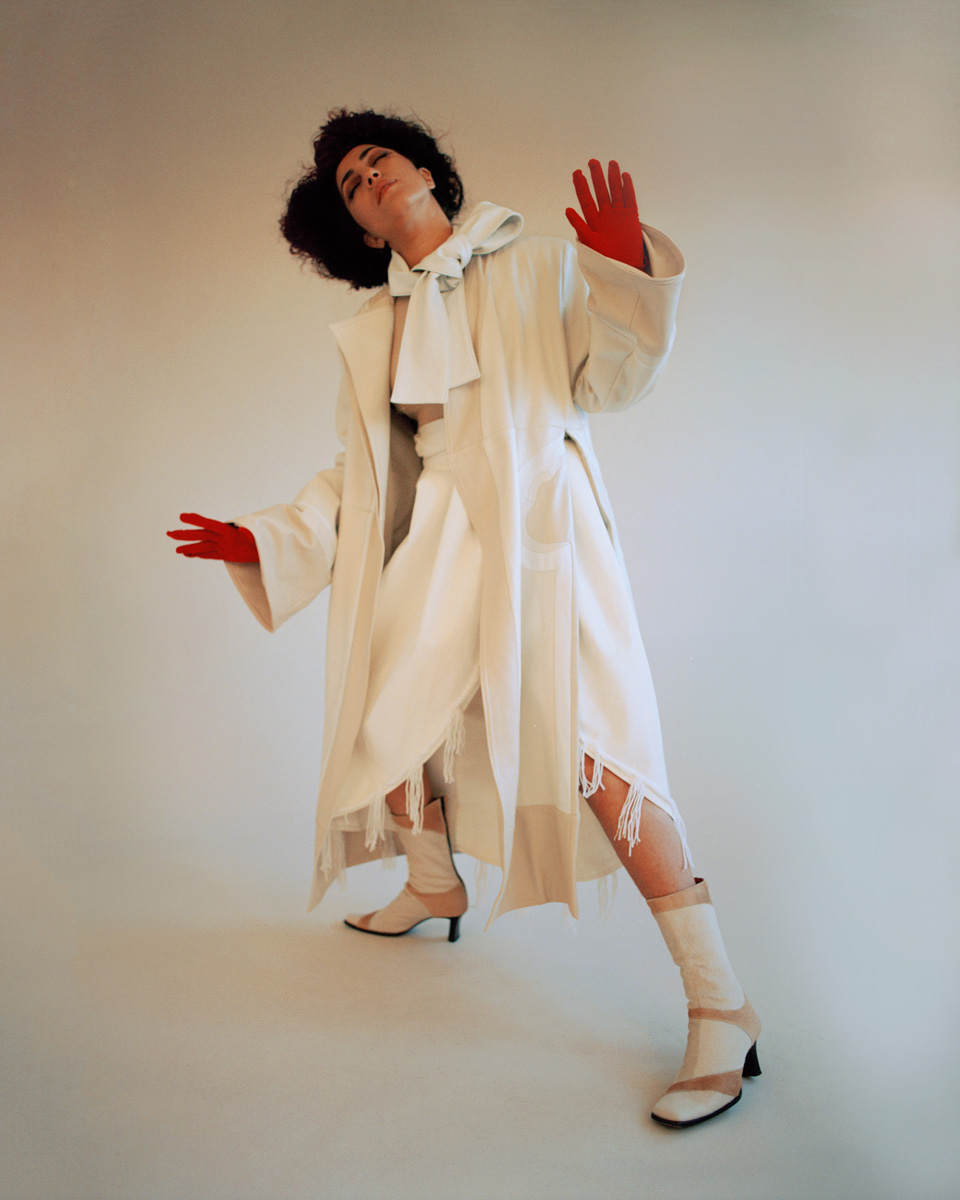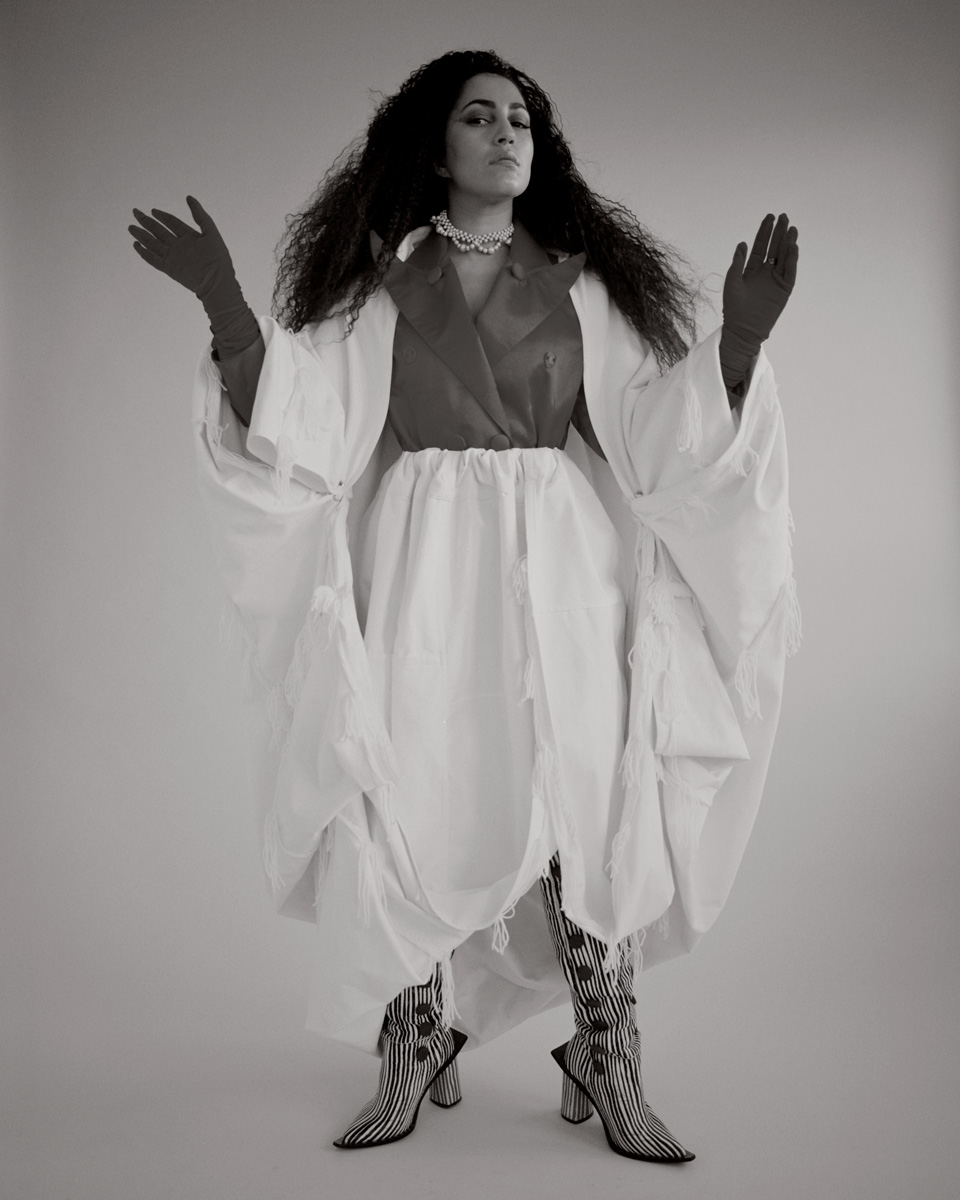“I’m not interested in having to choose between fantasy and sharing my experience. I want both.”

“I took your lips so I can kiss you upside down,” Lafawndah sings in a high, sweet voice before the beat comes in on the opening of Daddy, the first single taken from her debut album Ancestor Boy. The cover art of that album shows Lafawndah under a deep-blue sky in the South of France, dressed in a regal look by New York fashion label NIHL, her hair towering like a crown. This album is grand.
You may have heard of Lafawndah through her mixtape series, Honey Colony, on which she released an iconic remake of a Cardi B Insta video. Or her collaboration with Midori Takada, Le Renard Bleu, which was the Japanese percussionist’s first work in 20 years.
That first line lingers long after the album finishes. It’s sweet and it’s intense. Daddy’s lyrics tell us it’s a love song, but the beat is ominous, like a combination of sunshine and thunder. “I love writing,” Lafawndah says to explain why she’s only doing email interviews to promote Ancestor Boy. “It’s not even cause I’m more considerate, cause I would never read back after I write the first time. But yeah, writing thoughts down feels more precise to me. It also helps me understand myself and my intentions.” What follows here is an exact copy of the e-mail from Lafawndah that landed in our inbox.

Dress and earrings William Dill-Russell, sleeves Costume Studio
Ancestor Boy follows a lot of (collaborative) work you’ve done over the past year. What was your journey as an artist from those collaborative projects to this solo work like?
My journey has always been collaborative. My first EP was produced by my best friend Emily King and I. And from then, I’ve always pursued working with people I love, new people I love, and people I crossed path[s] with. I would most definitely say that my album is a collaborative work. It is under my vision, my will, my world but a lot of people were invited along the way and elevated the project.
An album is just an opportunity to share more of yourself, it’s a way to unfold and develop and surprise yourself with all the unknown corners you can hit while reaching out to the outside world in a more completed way. It just felt natural to dive in [to] a long process of soul searching. For me, an album is also about seeking clarity within you. I need clarity to write a song, because a song is a mean[s] of communication and if I can’t understand it for myself then I can’t expect anyone to connect with it either.

Coat Daisy Yu, bodysuit Stephverano, skirt Maissane Zinai, boots Jade Palace
In what environment(s) did you record the album?
This album is a nomad. I made it while travelling and not having a house and making one for myself everywhere I’d be. Different stages of the creation had different needs. The composition was usually me + one or two more people, Nick Weiss, Aaron David Ross and LVIS1990 being my main collaborators. The lyrics writing and the vocal melodies were more a solitary process. Then sometimes I’d ask friends to come around. And yeah, not everything comes from a decision to work on it. Sometimes amazing things would come out of a simple hang with people I love and because in that moment I was able to express myself with more clarity and because they would help me to do so, that would give birth to a chorus or a verse. The making of an album is a fine balance between being outside of the world, in isolation, looking inwards and just living life, the strongest you possibly can.
A lot of your songs feel like love songs, but they never really go to that cheesy place. The Guardian described this as “deceptive”. Do you feel like this is the right way to describe your sound?
There seems to be an assumption in your question that love songs or break up songs have to necessarily be addressed to an individual. And so if that’s the case, you would think of my songs as deceptive. To me, deceptive is not an accurate way to describe my songs. There are always multiple registers of address in my songs.
Why did you choose to title, Ancestor Boy?
Because it sounds like what it is. Explorer music. It’s the title of a tale. Of an adventure. And because it contains a cycle of life and death with the way these two words interact with each other.

Cape Maissane Zinai, jacket William Dill-Russell, boots Kinga Kasinska, necklace and gloves CARI2IE
Thinking about this boy, we consider what it means to nurture him. What does the concept of nurture mean to you?
Nurturing to me has to do with something external, my immediate surroundings and hopefully how that can radiate and ripple. I come from a culture where we nurture to a point where we always come after everyone else and I’m trying to find a balance. The natural thing for me is to make sure at all times everyone around me is good, got what they need, and think about how I can give towards that. But I don’t want to come second anymore. Nurturing with thoughts, with food, with mental care, with physical care, with joy, with financial support—all of that is nurturing to me. The meaning shifted recently to me because now I’m thinking about how to do that for myself as well.

Jacket and dress William Dill-Russell
What’s the last person or thing you remember nurturing?
My lover.
You’ve previously mentioned that the Robert Altman film 3 Women was an inspiration for the album. What was it about that movie that struck you?
The way that psychologies and personalities and subjectivities are not stable. The characters’ consciousness sometimes fuses and trade places. The kind of tension between it being a horror movie but told in such a pastel way. There is resistance in that. Also, after I watched it the first time I read about it and the fact that he wrote it in one stream, waking up from a dream made so much sense to me on why it felt so free.
Could you tell me something about the cover art for the album?
I just invited all my favourite women. We took a trip. There was symbolism involved. This was shot in Marseille which is the most vibrant city in France and the port from which every non-French person from ex-colonies has arrived.
I wanted a sense of scale as well. I wanted to look like a narrator. The one from the tale. The one that invites you in. The rest is magic, really. The talent and the love of all my girlfriends who enable me to tell me story.
Lastly, how does this visual side relate to the sonic side of your work?
The music and the visuals come hand in hand. They complete each other. I shot my first film this year. It has no music in it. It’s called LEK. So I have an independent relationship to images that is at least as important than the music itself. I’m really interested in world building. Images, costumes, objects, smells. I think about all of it when I make the music. I think that for a long time people of colour have been pushed in the corners of realism, you know? Not so much in music because the ’90s would be the perfect counter examples, but image wise for sure. In movies, for sure. It’s been about telling our stories, in an earnest and almost documentary style. Myths have been denied to people of colour in popular culture. I’m not interested in having to choose between fantasy and sharing my experience. I want both. And this is why my imagery is as important as my music.
Words by Emma van Meyeren
Photography by Eleanor Hardwick
Styling: Neesha Tulsi Champaneria
Hair: Hirokazu EnDo
Make-up: Jinny Kim
Follow Lafawndah on Instagram
soundcloud.com/lafawndah